Diesel generators have been widely accepted as reliable and efficient in various industries and applications. These machines serve as critical safeguard measures in maintaining power supply to critical infrastructure during power failures, providing power for remote construction sites, or even as an energy backup to keep businesses running. This article examines diesel generators, their power capabilities, the various types, and the versatile applications they offer, while also exploring the manufacturing process of diesel generators. By comprehending these powerful machines inside and out, one comes to understand why diesel generators are an integral part of contemporary power solutions. Continue reading on to discover how they work, what gives them their positivity, and how to select one that suits you most.
Introduction to Diesel Generators
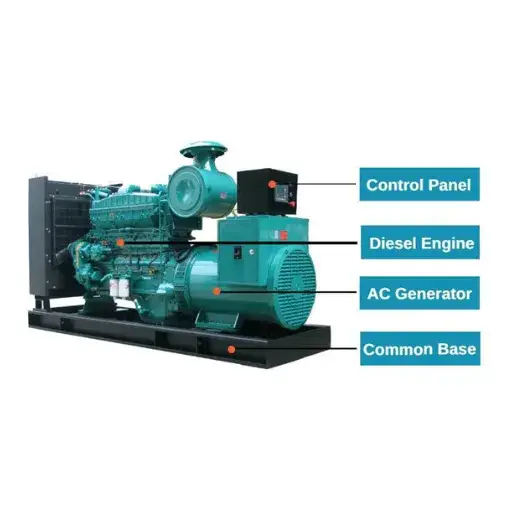
A diesel generator, essentially a diesel engine coupled to an alternator, is a machine used for producing electrical energy. The primary use of these generators as backup power would be in homes, corporate sites, or industrial setups during power outages. Lifestyle-wise, diesel generators rank among the top due to their fuel efficiency and longevity during their short working life, hence ensuring constant power generation. They are available in various sizes for different applications, ranging from compact models that can be taken anywhere for small tasks to larger ones that serve industrial purposes. These generators are specifically designed for use in situations where the load for generation needs to remain uninterrupted, such as hospitals, data centers, and remote locations.
How Diesel Generators Work
Diesel generators run by converting the chemical energy stored in diesel fuel into mechanical energy. During this process, the diesel engine undergoes combustion, forcing the pistons to move. The reciprocating motion of the pistons turns the crankshaft and operates the alternator of the generator. Electricity generation occurs through the alternator by electromagnetic induction, where the magnetic field of the rotor is operated in front of the stationary winding. Modern diesel generators are equipped with intelligent controls and monitoring programs that maintain voltage while promoting efficient fuel consumption and reliability. Due to its ability to provide stable power, the diesel generator offers a reliable solution for load shedding and continuous operation.
Types of Diesel Generators
Here’s a concise table summarizing the Types of Diesel Generators along with key points and parameters:
| Type | Power Rating | Applications | Advantages | Disadvantages |
|---|---|---|---|---|
| Portable Generators | Below 75 kVA | Homes, small businesses, camping | Easy to transport, affordable | Limited power, short runtime |
| Standby Generators | 75-750 kVA | Hospitals, data centers, offices | Reliable backup, automatic start | High cost, requires maintenance |
| Industrial Generators | Above 750 kVA | Factories, mining, oil & gas | High power, durable | Expensive, large size |
| Residential Generators | Below 75 kVA | Homes, small buildings | Compact, affordable | Limited capacity |
| Hybrid Generators | Varies | Remote areas, eco-friendly setups | Fuel-efficient, low emissions | High initial cost |
| Marine Generators | 75-375 kVA | Ships, offshore platforms | Corrosion-resistant, reliable | Specialized maintenance needed |
| Silent Generators | Varies | Urban areas, noise-sensitive zones | Low noise, compact design | Higher cost |
| Containerized Generators | Above 750 kVA | Construction, disaster relief | Weatherproof, scalable | Bulky, high transport cost |
Advantages and Disadvantages of Diesel Generators
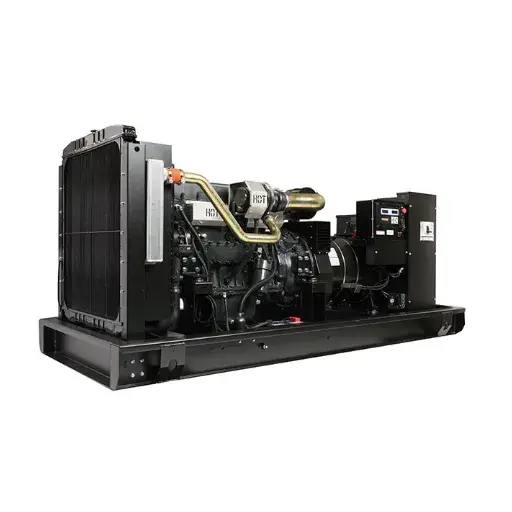
✓ Advantages:
- Fuel Efficiency: Being more fuel-efficient than their gasoline-operated counterparts, these generators are apt for long-hour operations.
- Durability: Built to last, they provide ruggedness and reliability in harsh environments.
- Power Output: Diesel generators are capable of providing a substantial amount of power, making them suitable for industrial and large-scale applications.
- Low Maintenance: They likewise require less maintenance due to the solid design of the diesel engine.
- Availability of Fuel: Diesel is readily available in most parts of the world, ensuring a steady supply for generator operation, even in the most remote areas.
- Safety: Being less flammable than gasoline, diesel generators are a safe option in many environments.
⚠ Disadvantages:
- High Initial Cost: Diesel generators typically require a higher capital outlay upfront as compared with other types of generators.
- Noise Levels: Many models are noisy, despite some being designed to operate quietly.
- Fuel Availability and Storage: Diesel fuel needs to be stored and handled with caution, which can be a source of niggling logistics.
- Emission Concerns: Though the situation is improving, diesel engines emit higher levels of harmful gases than some other alternatives, hence posing an environmental concern.
- Fuel Quality Sensitivity: Diesel generators require the delivery of high-quality diesel to operate efficiently. Poor-quality diesel or contamination can lead to degraded performance and increased maintenance costs.
- Bulk and Weight: In terms of portable generators, diesel generators tend to be heavier and bulkier. The bulkiness is due to the heavy metal construction and additional components, which usually compromise portability compared to that of inverter generators.
Maintenance Tips for Diesel Generators
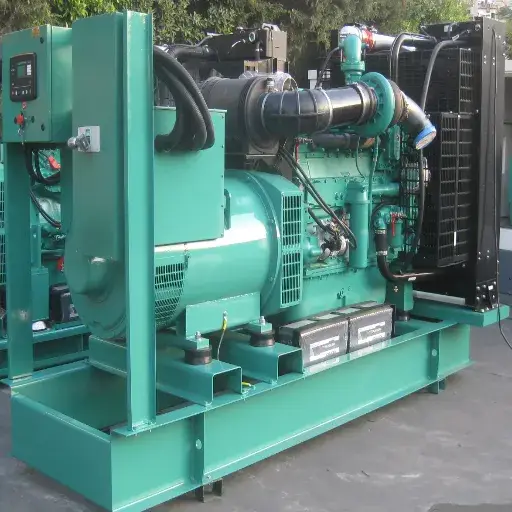
- Regular Oil Changes: Change the oil at the specified intervals according to the manufacturer’s specifications, allowing the engine to perform efficiently and extend its lifespan.
- Inspect and Clean the Air Filters: A dirty air filter diminishes performance and raises fuel consumption. Inspect it and clean or replace it accordingly.
- Check Coolant Levels: Always check the coolant levels, as lower levels can cause overheating of the generator, defeating the purpose of having one.
- Fuel System Maintenance: Use clean diesel fuel. The fuel system must also be cleaned periodically to prevent blockages and contamination.
- Battery Inspection: Check the battery for a proper charge. Check the terminals for cleanliness and ensure tight connections to prevent any issues during startup.
- Run the Generator Periodically: Keep the generator running to maintain engine lubrication and ensure all components are functioning correctly.
- Inspect Belts and Hoses: Check for signs of wear or damage on belts and hoses, and replace them as necessary to prevent a breakdown.
- Schedule Professional Servicing: Follow the manufacturer-recommended service intervals and have a professional conduct thorough inspections regularly.
Importance of Regular Maintenance
Regular maintenance is essential to ensure your generator’s reliability, efficiency, and lifespan. Sticking to a regular maintenance schedule significantly reduces the likelihood of equipment failure, costly repairs, and performance loss. Although preventing maintenance could extend the life of a generator by as much as 50%, the same process would sharply reduce operational downtime risks. Moreover, well-maintained generators can significantly improve energy efficiency, thereby lowering operational expenditures and lessening their environmental impact.
Common Issues and Solutions
A common problem that arises with generators is battery failure, which typically occurs due to insufficient charging or the degradation of the battery’s condition over time. Regularly checking the battery and maintaining proper charging schedules will prevent this from happening. Fuel can for another! Contamination by water or debris can enter the fuel system, a problem commonly encountered. Use only high-quality, clean fuel and clean the fuel tank periodically. Also, neglecting the cooling system can lead to overheating. It’s good practice to check coolant levels regularly and ensure that there are no blockages in the radiator. Fixing these common problems with your generators will go a long way in restoring their reliability and effectiveness.
Industry Applications of Diesel Generators
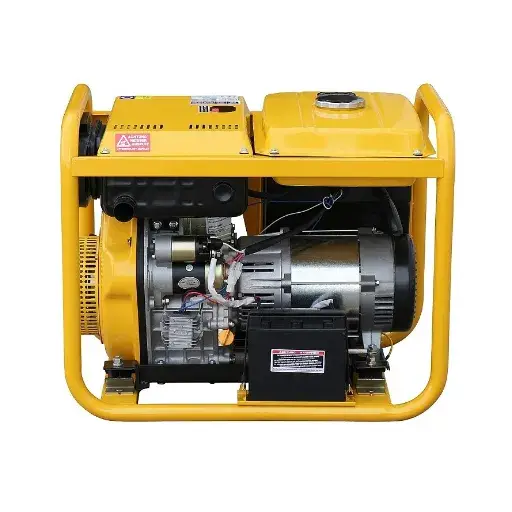
Diesel generators find applications in numerous industries due to their ability to generate reliable and appropriate power. The primary uses include:
🏗️ Construction
It will be used for powering tools, heavy machinery, and lighting at job sites where grid power is unavailable.
🏥 Healthcare
Used by hospitals or clinics to maintain the operations of life-saving equipment during outages.
🏭 Manufacturing
It can be used as a backup power source for production processes or to keep equipment running uninterrupted.
💾 Data Centers
For uninterrupted operation of servers or critical systems to prevent data loss during an outage.
🌾 Agriculture
Powers remote irrigation systems, grain dryers, and so forth.
📡 Telecommunications
Provides backup power to communication towers to sustain network operation and connectivity.
Commercial Applications
- Retail Stores: Provides backup power to keep lighting, refrigeration, and POS systems operational in the event of a power outage, ensuring a seamless customer experience.
- Healthcare Facilities: Provides emergency power backup for critical medical equipment and life-support systems, so patient care is not compromised.
- Hospitality Industry: Provide power to vital systems, such as heating and cooling systems, and kitchen appliances, to ensure all necessary operations run smoothly and further guarantee guest comfort.
- Construction Sites: Can power onsite equipment and tools where electrical grid access is absent, supporting unimpeded workflow.
When viewed in the context of the latest data and trends, these applications underscore the increasing demand for backup power solutions across various industries. With modern search engine insights, questions about portable and green energy are increasingly being searched, placing an ever-increasing importance on green and alternative energy options. It suggests a slight shift towards the search for more flexible or environmentally friendly energy technologies in commercial sectors.
Residential Use and Backup Power
In discussing residential use and backup power, it is essential to note that all of this consideration means that having energy ready in case of an outage ensures comfort and safety. Backup power, either through generators or solar battery systems, will relax the energy-conscious homeowner a bit by keeping critical appliances and devices operational as they face unforeseen disruption.
Choosing the Right Diesel Generator for Your Needs
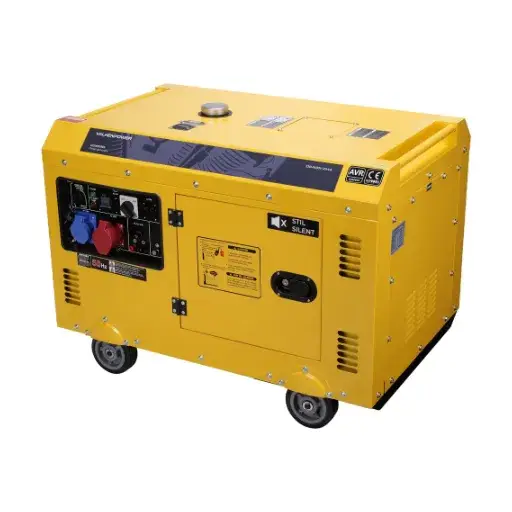
When determining the correct pick of a diesel generator according to your needs, assessing your power requirements should be the first step. Determine the total wattage of the essential appliances and gadgets that are expected to be running during an outage, so that the generator can bear the total load. Then, analyze fuel efficiency and runtime to coincide with expected usage patterns. Opt for a tried-and-tested brand that offers durability and good support, and verify that the generator complies with safety and emission standards. Lastly, assess noise levels and portability options, if they have some bearing on the specific application being considered. Making these considerations a priority will ensure you settle on a diesel generator that can serve well while being trustworthy.
Factors to Consider
Power requirements and their situations are the foremost considerations in choosing between a portable and a standby diesel generator. For temporary or occasional use, such as an outdoor event, a small commercial job, or limited backup power during outages, a portable generator is suitable. The unit is typically small and easy to carry, while being affordable up front. They offer a limited power capacity, which is not ideal for use with heavy appliances or prolonged use.
Standby generators are those that are installed at a property and used for power on a long-term, uninterrupted basis. Thus, they are suitable for homes, businesses, or facilities that require standby power due to frequent or prolonged outages. Upon a power loss, the standby generator detects it automatically and starts without any manual intervention, introducing comfort and peace of mind. They have a significant initial cost but serve best in standby power applications, making them worthwhile due to their longevity and power capacity. Different situations may present such options; therefore, consider the aligned priorities when choosing a generator type.
Understanding Generator Ratings
Generator ratings are a deciding factor when choosing a suitable one for your specific needs. The ratings include watts (W) and kilowatts (kW), which describe the generator’s output capacity, i.e., the number of appliances or loads it can power simultaneously. To decide on the rating to choose for your generator, you calculate the total wattage from the devices and systems you wish to operate during a power outage, including the starting and running wattage requirements, so that the generator can cater to either figure. Consider also whether it is a standby rating or a continuous rating, as some generators may be used for short-term emergency power. In contrast, others may be rated for prolonged use. Always consider these ratings in relation to your energy needs before making the final decision.
Reference Sources
Here are five professional and authoritative sources on diesel generators and their uses, which you might want to consult to check the accuracy of the article:
- Top Small Diesel Generators for Portable Power – Oregon State University blog discussing diesel generators and their efficiency.
- Portable Diesel Fuel Generators – Environment, Health & Safety – University of Michigan’s Environment, Health & Safety page on diesel fuel generators and spill prevention.
- (DOC) What Is a Diesel Generator – An academic paper on diesel generators, their functionality, and applications.
- A Life Cycle Assessment of a Diesel Generator – A thesis on the life cycle assessment of diesel generators, hosted on Montana Tech’s Digital Commons.
- Diesel Generator – A document from the U.S. Department of Energy discussing diesel generators and their applications.
Frequently Asked Questions (FAQs)
❓ What is a diesel generator?
A diesel generator is a robust electric generator that converts diesel fuel into electrical energy. These machines are widely used to provide reliable power in various applications, ranging from commercial settings to remote locations where electricity is not readily available.
❓ What are the benefits of using a diesel-powered generator?
Diesel-powered generators are known for their efficiency and long-lasting performance. They can operate for extended periods with lower fuel consumption compared to gasoline generators, making them a cost-effective choice for users who require consistent power.
❓ What applications demand diesel generators?
Diesel generators are crucial for applications that demand reliable power, such as construction sites, hospitals, and data centers. Their ability to provide uninterrupted electricity makes them suitable for critical operations where power outages can lead to significant losses.
❓ How do I select the right size of diesel generator?
Selecting the right size of diesel generator involves calculating your power needs. Consider the total wattage of all devices and equipment you intend to run. It’s essential to choose a generator that exceeds these requirements to efficiently accommodate peak loads.
❓ Are diesel generators cheaper to operate than gasoline generators?
Yes, diesel generators are generally cheaper to operate in the long run. They have lower fuel costs, longer service intervals, and higher durability, which reduces overall operating costs when compared to gasoline generators.
❓ What is a mobile diesel generator?
A mobile diesel generator is designed for portability and ease of use. Often mounted on a trailer, these generators can be easily transported to different locations, making them ideal for temporary power solutions at events or construction sites.
❓ What brands are known for reliable diesel generators?
Brands like Generac, Cummins, and Onan QD are recognized for producing high-quality diesel generators. They offer a range of models that cater to various power needs, ensuring exceptional performance and reliability.
❓ How long do diesel generators last?
With proper maintenance, diesel generators can last for many years, often exceeding 10,000 hours of operation. Their robust construction is designed to withstand heavy use, making them a long-lasting investment for users.
❓ What are the operating costs associated with diesel generators?
Operating costs for diesel generators include fuel expenses, maintenance, and repairs. While the initial investment may be higher than that of other types, the efficiency and longevity of diesel generators often result in lower overall costs in the long term.
